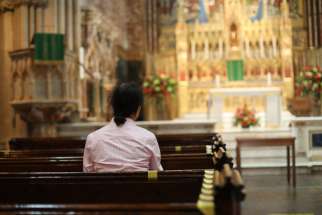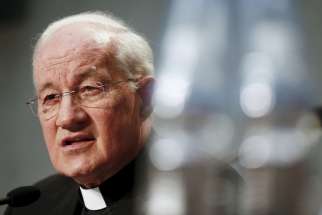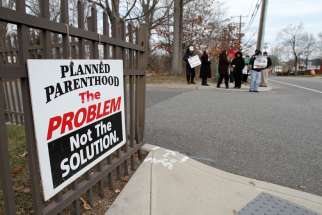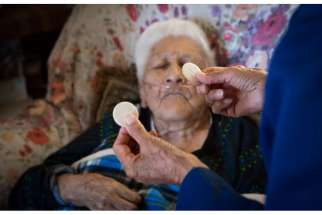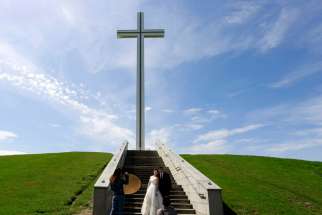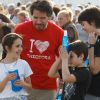An English bishop said Catholics must work harder to evangelize the U.K. after the latest official census showed that Christians were a minority for the first time since records began.
A majority of people in Scotland have no religion
CANTERBURY, England – More than half of the 5.4 million people living in Scotland have no religion, according to a survey published by Scottish Social Attitudes.
Cardinal confirms some priests decline appointment as bishop
VATICAN CITY - Although the number is not high, it is no longer "exceptional" to have priests turn down an appointment as bishop, said Canadian Cardinal Marc Ouellet, prefect of the Congregation for Bishops.
WASHINGTON - An Associated Press survey of abortion in the United States this decade has revealed that the number of abortions has gone down by 12 per cent since 2010.
A crumbling foundation
As advocates of same-sex marriage celebrated Ireland’s recent referendum, supporters of traditional marriage were left to lament yet another defeat. Meanwhile, I attended the sacramental union of my beautiful sister Alexandra to her dashing husband Michael.
A new report mapping the Catholic Church’s more than 1.2 billion souls — on track to reach 1.64 billion by 2050 — holds some surprises.
And not all bode well for the Church’s future as it faces major demographic and social shifts.
CANTERBURY, England - “In Ireland,” says a character in a 1904 George Bernard Shaw play, “the people is the Church, and the Church is the people.”
VATICAN CITY - The number of Catholics in the world and the number of priests, permanent deacons and religious men all increased in 2012, while the number of women in religious orders continued to decline, according to Vatican statistics.
Canadian census figures show 'devastating' decline in traditional family
OTTAWA - Canada's latest census figures showing a continued decline in married-couple families and a hefty rise in lone-parent and common-law arrangements are “sad and worrisome” and “nothing to celebrate,” say pro-family organizations.
Peter Murphy, assistant director of the Catholic Organization for Life and Family (COLF), said the “handwriting is on the wall” as the 2011 census reveals the number of common-law couples has risen 13.9 per cent since 2006 and lone-parent families have increased by eight per cent. The number of children living with married parents declined from 68.4 per cent to 63.6 per cent from 2006 to 2011, Statistics Canada reported in a Sept. 19 release of data on family structures. But when the figures are examined over 50 years, the picture shows a dramatic decline from around 90 per cent of married couple families in 1961. A steep decline began in the mid-1970s.
“Despite an attempt by the media to make ‘diversity’ in family structure seem like a good in itself, when it comes to questions pertaining to procreation and child-rearing the ‘writing’ is inscribed on the human body,” Murphy said in an e-mail interview. “It takes a man and a woman to conceive a child and, as the social sciences have told us repeatedly, it is in the best interest of children to be raised by a man and a woman united in marriage.
“Study after study has found that the advantaged child is the one raised by one woman and one man in a stable, committed relationship,” he said. “This is because God, our creator, has made the union of man and woman fruitful and this fruitfulness is not limited to physical procreation.”
The Institute of Marriage and Family Canada (IMFC) warned the family related data outlines an “alarming trend” that will lead to greater child poverty. IMFC research and communications manager Andrea Mrozek said she was disturbed by the “chirpy” response to the troubling data in the mainstream news media.
Mrozek said the IMFC has shown in its research that family breakdown is linked to poverty — citing the 2006 census which showed 8.2 per cent of married couples were in poverty, according to the Low Income Cut Off (LICO), compared with 16 per cent of lone-parent families headed by men and 32.2 per cent of lone-parent families headed by women.
The media seemed to be applauding the growth of more diverse, progressive family circumstances, she said. The coverage was “superficial” and misses the real story of demographic and family decline that is “devastating” for Canada as a country and for every individual touched by family breakdown, said Mrozek.
Most social science research in the United States has acknowledged that the married couple raising children biologically related to them is the best for children on a range of outcomes from poverty levels to drug or alcohol abuse, trouble with the law, mental health, early sexual activity and future success at maintaining stable marriages themselves, Mrozek points out. This message has not reached most policy advisors in Canada.
COLF agrees the research shows married-couple families raising children biologically related to them have the best outcomes.
“The social cost of equating ‘alternative’ parenting relationships with the traditional family has already had a profoundly negative impact on society,” Murphy said. “To begin with, children raised in non-traditional family structures are statistically more vulnerable to abuse and to developmental and social problems of various kinds. Both the children themselves and society in general end up paying a high price.”
Like Mrozek, Murphy shares concerns Canada’s aging population and dwindling number of working taxpayers make the cost of family breakdown “increasingly difficult to bear.”
“Not surprisingly, in such circumstances, some are already pushing for euthanasia,” he said. “If we are serious about wanting to forestall further societal damage, we need to embrace God’s vision for human sexuality and the human family — the vision so beautifully articulated by Blessed John Paul II in his Theology of the Body.
“Healthy families make for healthy citizens,” he said. “At every level of society, we need to make support for the traditional family a priority.”


